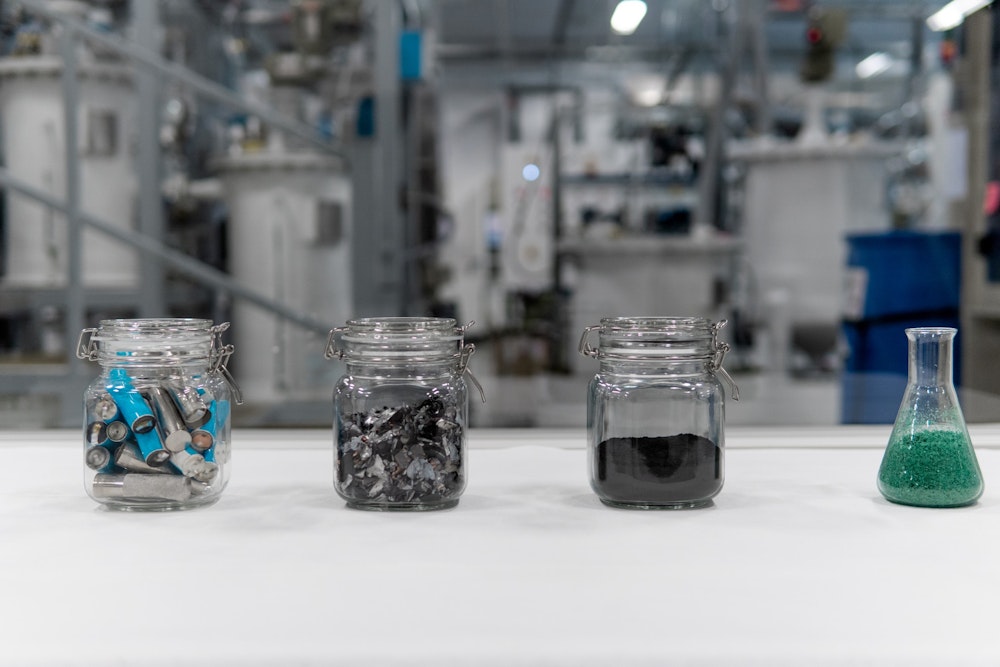Northvolt produces the first fully recycled battery cell.
Northvolt has produced its first battery cell with 100% recycled nickel, manganese and cobalt and now aims towards scale-up of recycling facilities in Sweden.
They are looking forward to establishing 125,000 ton/year giga recycling plant
The following written content from Northvolt

Northvolt recycling program, Revolt, has produced its first battery cell with 100% recycled nickel, manganese and cobalt. Following material validation, electrochemical performance testing of cells produced with recycled metals demonstrates performance on par with cells produced with freshly-mined metals
Committed to accelerating battery recycling and its impact on battery production, Northvolt aims to expand its recycling plant capacity to enable recycling of 125,000 tons of batteries per year, amounting to approximately 30 GWh of battery production per year
Read: Announcing: BMW’s All-Electric i4 Sedan Is in Production!
November 12, 2021 | Stockholm, Sweden – Northvolt today announced that its recycling program, Revolt, has produced its first lithium-ion battery cell featuring a nickel-manganese-cobalt (NMC) cathode produced with metals recovered through the recycling of battery waste.
Uniquely, all recycling and production processes were completed on a single site, at Northvolt Labs in Västerås, Sweden. The development stands as a breakthrough for the battery industry and a milestone for Northvolt in its mission establish a sustainable supply of batteries to support the decarbonization of society.
Emma Nehrenheim, Northvolt’s Chief Environmental Officer and head of Revolt, commented: “What we have shown here is a clear pathway to closing the loop on batteries and that there exists a sustainable, environmentally-preferable alternative to conventional mining in order to source raw materials for battery production. The recycling process can recover up to 95% of the metals in a battery to a level of purity on par with fresh virgin material. What we need now is to scale-up recycling capacities in anticipation of future volumes of batteries requiring recycling.”
Recycled nickel, manganese and cobalt metals used in the battery cell were recovered from battery waste through a low-energy hydrometallurgical treatment which involves the use of an aqueous solution to isolate the metals and separate them from impurities.
Having proven the validity and efficiency of its recycling process, Northvolt now turns attention to the scaling-up of recycling capacities to fulfil its aim of producing cells with 50% recycled material by 2030.
To secure this, Revolt Ett, the company’s first giga-scale recycling plant under development adjacent to Northvolt Ett gigafactory in Skellefteå, Sweden, will be expanded beyond its initial design to enable recycling of 125,000 tons of batteries per year.
With construction beginning in Q1 2022 and operations in 2023, the recycling plant will receive incoming material for recycling from two sources: end-of-life batteries from electric vehicles and production scrap from Northvolt Ett.
In addition to becoming Europe’s largest battery recycling plant, Revolt Ett will be the only large-scale facility in Europe capable of recycling lithium in addition to nickel, manganese, cobalt and other metals. Recovered materials from Revolt Ett will supply neighboring Northvolt Ett cell manufacturing gigafactory with recycled metals sufficient for 30 GWh of battery production per year (half of Northvolt Ett’s total annual cell output).
Alongside direct delivery of nickel, manganese, cobalt and lithium metals into Northvolt battery production processes, Revolt Ett will recover copper, aluminium and plastics from the batteries and materials it recycles – all of which will be recirculated back into manufacturing flows through local third-parties.
Emma Nehrenheim comments: “As the electric vehicle revolution gains speed, we should be mindful that some 250,000 tons of batteries will reach their end-of-life in Europe by 2030. In this, some see challenges and obstacles. At Northvolt, we see opportunity. Similar to how we’ve found novel, sustainable solutions for the handling of salt byproduct at Northvolt Ett – treating it as a valuable product and not waste – the same is true with end-of-life batteries. Ultimately, a commitment to circularity will not only significantly reduce the environmental impacts of the battery industry, Read more from Northvolt





